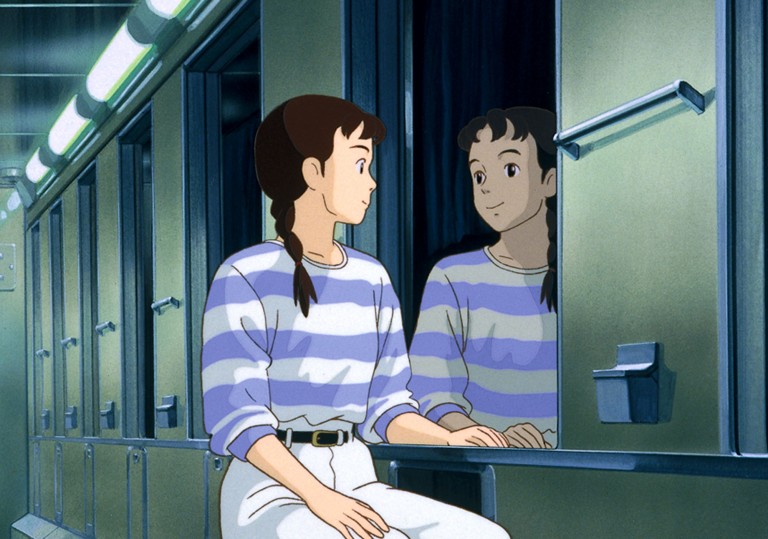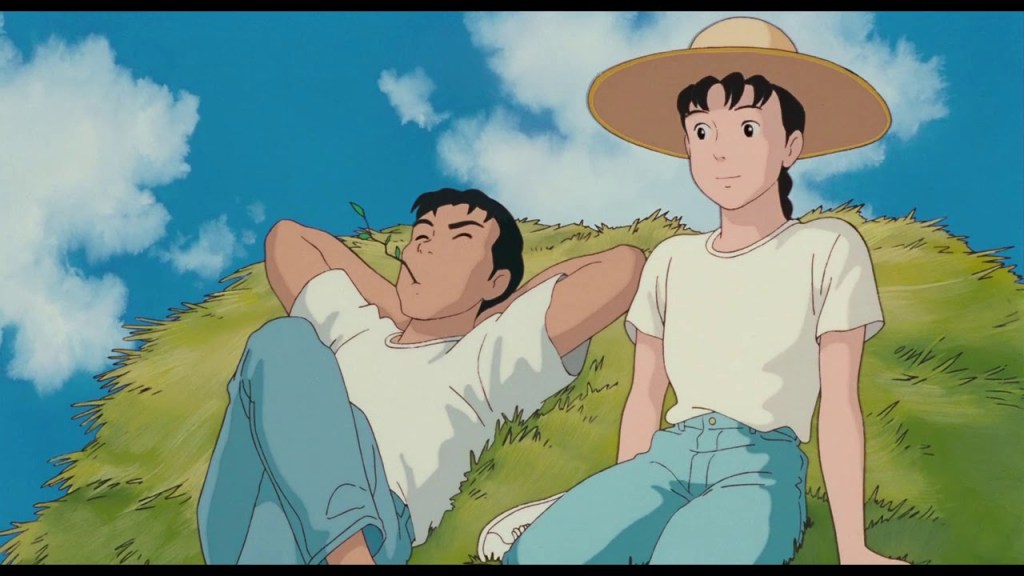
I think Peter Travers was right when he said, “What we have here is an animation miracle so subtle that it doesn’t fully hit you till you take it home and into your dreams.” The animation miracle he referred to was the movie Only Yesterday (1991).
The plot revolves around Taeko Okajima, a 27- year old office worker leaving for a few weeks to go work in the country for some of her sister’s in-laws. As she goes home, travels, and works, she regularly reflects on her 5th-grade self. As this continues to happen, she wonders if maybe she was yet again “a chrysalis” on the verge of becoming something. She pondered how maybe, “perhaps (her) fifth grade self (was) trying to tell (her) a new way to fly.” (Quote from the movie.)
This film’s plot is relatively simple at first glance. But on further reflection, it hits closer to home than previously anticipated. I know that was how it was for me. I am glad I didn’t see this movie until I was 29 because I am at a stage in my life where I understand Taeko, the main character, and her simple journey into “becoming” once again.
I think Only Yesterday has more clarity for adults because it addresses issues adults understand. We’ve grown up physically and are just realizing what it means to blossom in other aspects of our selves. We are always growing into ourselves, and with each stage of life, this growth becomes all the more complex and beautiful.

For Taeko, this meant two new dreams unfolding for her. She found she wanted to live in the countryside and feel a deeper connection to the earth and people. She had also never thought marriage really was in her future. In fact, she wasn’t looking for romance for the majority of the film. However, she did find someone she wanted to marry. These simple blessings blossomed for her in a quiet, unassuming way.
To find these things for herself, she needed to look back at a point in her life when she also faced important changes. From becoming aware of boys, learning about periods and puberty, or even facing difficulties in math, she was at an important time in her life. So much was changing, rapidly swirling as she faced disappointments, family disputes, and her own insecurities. And, 16 years later, Taeko was facing another transition.
I’ve learned so much about myself watching this film. I am not the only one either. By chance, I came across Isaac Yuen’s review of the movie. I completely understood him when he reflected on his own relation to it.
I came across Studio Ghibli’s Only Yesterday (titled Omohide Poro Poro in Japan) at a time of transition in my life. Having just having graduated from school and secured a job in my field, I had hoped that the path forward was secure, certain. The hours were nice and the pay was good, but as time went on I felt a growing dissatisfaction I could not dismiss but could not articulate. Catching the film by chance on television one late night, I connected with the protagonist’s own yearning for something more in life. This resonance spanned the gulf between gender, culture, and life experience; her fictional journey of self-discovery inspired me to reflect honestly on my own life. How does the past shape my present identity? Am I satisfied with the course of my life? Am I courageous enough to pursue what makes me genuinely happy?
Nostalgia Distilled: Ghibli’s Only Yesterday, Isaac Yuen
I wondered about my life as well. Questions flitted through my mind subtly as I watched Taeko face her new life course. I thought, “Am I truly happy with where I am? Is there something missing from my life I am not aware of? Who am I becoming?”. I faced for the first time in a while that part of myself, who is still eleven years old and unsure of my future.

People rarely enjoy life as they are living it. . .
Life is busy, and we all have ideas and dreams taking up our thoughts and time. I’ve wondered about this concept for a long time. Life is busy, and we all have ideas and dreams taking up our thoughts and time. For much of my life, I’ve longed for certain life events to make me happy. At 16, I dreamed of being married, performing as a musician, and even writing a book. But, life is never so simple. I did not marry right out of college, I switched majors two years into college to history, losing my love of music in the process, and haven’t written anything fictional in a long time.
What happened to that vision longed for by my sixteen-year-old self? Could I have possibly seen how different my life would become? That is the thing. So much of our lives, we long for a particular future, neatly planned and romanticized. However, as we wait for that future for our happiness to blossom, it eludes us.
Oftentimes this leaves us empty. Other times bitter. For myself, I become reflective. A quote from President Thomas S. Monson often pops into my mind from his talk, “Finding joy in the Journey”. He stated,
This is our one and only chance at mortal life—here and now. The longer we live, the greater is our realization that it is brief. Opportunities come, and then they are gone. I believe that among the greatest lessons we are to learn in this short sojourn upon the earth are lessons that help us distinguish between what is important and what is not.
Finding Joy in the Journey, Thomas S. Monson
In the play Our Town, the main character Emily sadly lamented, ““Do … human beings ever realize life while they live it—every, every minute?” I think Taeko was able to look back so much on her past self because she finally had a chance to be still and think.

Do I love my work?
Seeing this movie, I enjoyed watching Taeko relish her time working and being involved with nature and people. A feeling of peace came into her life I couldn’t help admire. At that moment in her life, I could tell she truly enjoyed what she was doing. Her life and work were deeply satisfying, and it showed in her face.
Earning money is very important, but it isn’t needed for a meaningful life. I’ve noticed this as I have observed and talked to several potters. One potter, who I have bought multiple pieces from, told me how she used to have a higher paying job in an office. After some years, she realized how unhappy she was. So she switched to pottery and is the happiest she has been in a long time.
In one of my favorite books Remembering Isaac: The wise potter of Niederbipp (2009), the main character had a similar story. He reflected,
I’ve met a lot of potters over the years. . . I realized awhile ago that I have never met a rich one, but I have yet to meet one who is unhappy. . . I have friends that spent four years in college studying to do things they now hate dong. I have other friends that will be in school for another ten years to become doctors and scientists. I hope they’ll be happy when they finish, but they don’t seem happy now.
Ben Behuin, Remembering Isaac
For myself, I realized I don’t truly love my work. When I finish work every day, I don’t have that deep-seated satisfaction with where I am or what I have done. The best way I can describe it is, I am hungry for something different. I want to contribute more and be part of something bigger.
But how do you find such a job? When do you know? While watching Taeko, I realized such answers only come as we keep our eyes and hearts wide open and look for it. The answers do come, but they usually happen in simple, quiet moments.

Why haven’t you ever gotten married?
There is a scene in the middle of the film between Taeko and her new friend Toshio. Their converstion is a very familiar one to me.
Toshio: Why haven’t you ever gotten married?
Taeko: Huh? Why? Is it so strange that I’m single?
Toshio: Ah. . . No I didn’t mean that. . .
Taeko: There are plenty of women in the city who work. And I think my single friends outnumber the ones that are married.
Toshio: Ah, really?
Taeko: For sure.
Toshio: It makes sense.
Taeko: It’s true.
Toshio: Okay.
Taeko: It’s completely normal.
-quote from Only Yesterday
I am sure Toshio was not insinuating Taeko was strange or abnormal because she was unmarried. He was just curious, probably because he was interested in her. But for Taeko the question unsettled her. She later told him her struggle with multiplying and dividing fractions and her mother and sisters comments on her confusion. These Comments ranged from, “But Taeko is not a normal kid!”, “Shouldn’t you maybe get her IQ tested?”, “She’s getting dumber!”, and “She did fall down the stairs when she was a baby.”
Something as simple as struggling with math in Taeko’s mind transferred into other aspects of her life. She even told Toshio, “I believe that people who understand how to divide fractions right away understand life right away too. . . I think people who understood that saw life more clearly.”
When Taeko remembered this, I could relate. More than her struggle with math, I think it was how others reacted to her weakness that really hurt her. Her family and others criticized her for not quite fitting in. To them, she wasn’t normal. They felt, “Who cares if she was good at writing essays if she couldn’t even divide fractions?”. I’ve talked about this concept before in different posts. The funny thing about normal is it doesn’t fit anyone.

Need for connection to people and the land
I love Isao Takahata and his associate at studio Ghibli Hayao Miyazaki’s take on man’s connection to nature. There is always a balance in their films demonstrating man’s coexistence with the earth. They portray this interrelationship as a meaningful, important, and even pivotal aspect of their stories.
Takahata also demonstrated this in Only Yesterday. Another conversation Taeko had with Toshio reflects this principle. After leaving a more touristy natural wonder, Taeko comments once they return to the farmland, “Now this is countryside. The real countryside” There proceeding conversation is quite telling.
Toshio: It’s interesting you say that. . . City people see forest and woods and streams and they are happy because they think what they are seeing is nature. Apart from back deep in the mountains almost everything you see here is the work of a farmer.
Taeko: That so?
Toshio: Sure of course it is. . . Everything has been touched by man. Our ancestors planted this and cultivated that, encouraged mushrooms, berries, wild garlic. . . The sceneries come about by lucky accident as people have struggled with nature to get what they needed to survive.
Taeko: So without people this scenery wouldn’t have been here.
Toshio: No. It wouldn’t have. To get what they need from nature farmers have to do a lot of different things to make sure that nature will continue to provide forever. It’s sort of a joint venture between people and the earth. That’s how the countryside works.
Taeko: Now I get it. All these feelings I have, almost nostalgic for this place. There’s a connection even though it’s not where I grew up. Does that make any sense? Oh, so that’s what it is.
-excerpt from Only Yesterday
Movies often depict the link between man and nature because people have always needed a strong relationship with the earth.
I definitely have felt this for myself. I have always loved being outside. A principle I often employ in my life is “grounding” or “earthing” myself. I do this by taking off my shoes, walking in the grass, and sitting outside while watching the clouds. I’ve done this since I was a kid. As a child, I didn’t really know that was what I was doing, though.
When we separate ourselves from nature, we cut ourselves off from the healing and the connection we need from each other. This is not to say all of us need to become farmers. However, I wonder what it would be like if we pondered this relationship with nature more.

Will we have the courage to fly?
This film portrayed well how we can find the courage to move forward by learning from our past. To us, Taeko’s choice to stay and begin a new life in the countryside seems like the obvious right answer. This is because we can see everything from an outside point of view. But in our own lives, it isn’t so simple. I know for myself, each new change seems like a colossal seismic movement!
One of the greatest lessons I learned from this film is to allow myself to keep moving forward: to have the courage to become. Life evolves and if we are willing wonderful opportunities are waiting for us. Just life Taeko, even our simple lives matter, and the changes which come are extraordinary!


1 Comment